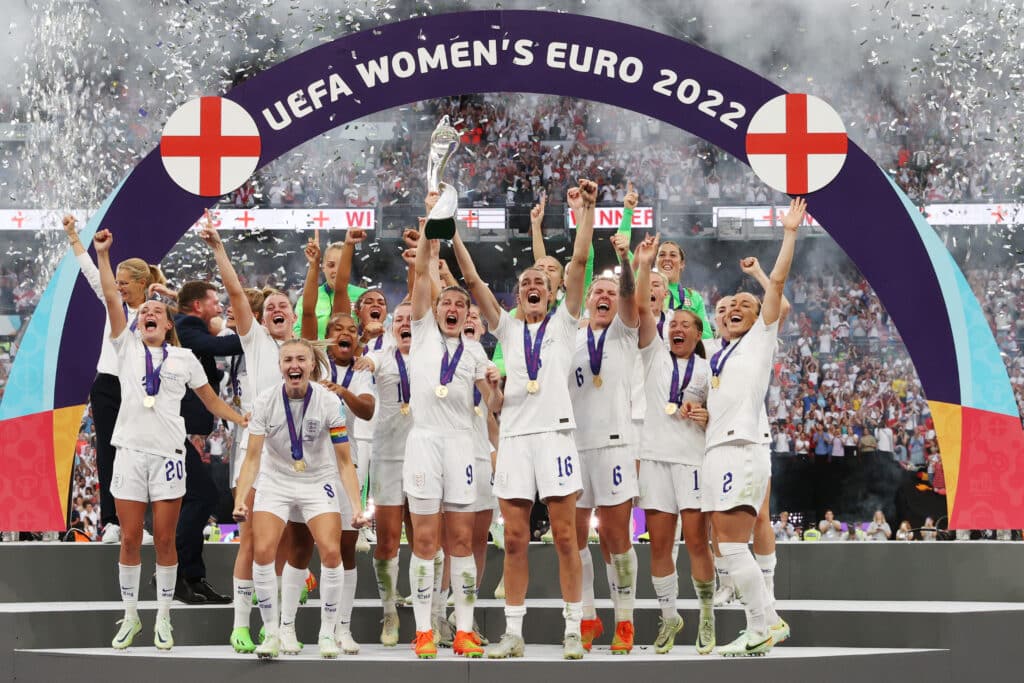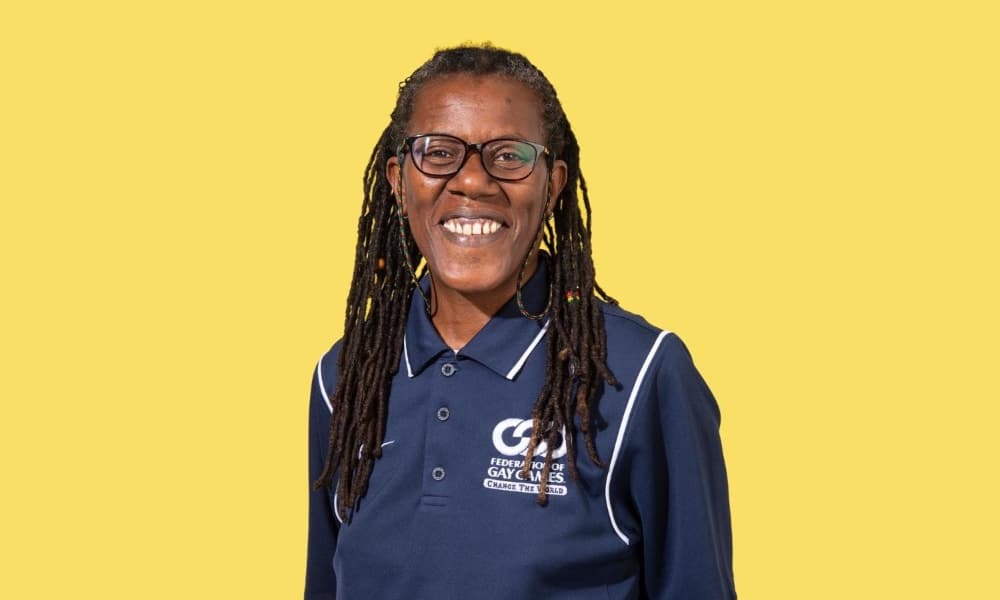Cementing the Lionesses’ legacy means crushing stigma around women’s football once and for all

Three out LGBTQ+ members of the England women’s football squad are included on the New Year Honours List 2023 (PinkNews/Getty images)
England’s triumphant win in the Women’s Euro 2022 championships could finally smash the homophobia that has long discouraged sportswomen, LGBTQ+ fans say.
On 31 July, the England women’s football team beat Germany 2-1 to win their first major football trophy, England’s first piece of silverware since the men’s team won the 1966 World Cup.
The team’s skilful performances in the tournament has sparked unprecedented national interest in women’s football – something the team is now rallying to cement – and has marked a turning point in attitudes towards female footballers.
“It’s hard to put into words what it felt like; the pure elation when the whistle blew,” Jamie Platts, a 27-year-old civil servant who is a member of Wales’ only LGBTQ+ football club, the Cardiff Dragons, told PinkNews
“There was an overwhelming feeling in the stadium that things were about to change in women’s football, that it was no longer women’s football and was now recognised as just football, getting the appreciation it finally deserves.”
The England team includes a number of out and proud LGBTQ+ players, but homophobia has historically been a problem in football.

Homophobia has long discouraged women from playing sports – but the Lionesses’ win could change that, say queer footie fans. (Sarah Stier – UEFA/UEFA via Getty Images)
A 2008 report by the Women’s Sport and Fitness Foundation said: “Some girls avoid certain sports for fear of being perceived as unfeminine or lesbian; some parents discourage their daughters from taking up sport; some lesbian athletes avoid going public about their sexuality in case they experience prejudice from other athletes and coaches, or lose public support or sponsorship.”
Things have changed, with many top-flight women’s players being out and proud as queer. But they remain many scarred by an upbringing where they were discouraged from following their passion.
Joanie Evans, a 60-year-old lesbian living in Islington, north London, is a football player who came out as a lesbian in the 1990s. She fell in love with the sport aged eight during the late 1960s, sneaking out of church in Birmingham to catch the Sunday match. But she had to get used pretty fast to being told she couldn’t play.
“I was lucky to have a kick around with my brothers if they let me,” she said.
It was only when aged 25 that she was told about women’s football teams – something she didn’t even think could exist – as she joined a local team of mainly lesbian players. She quickly discovered that the lesbophobia and misogyny that exists is largely external.
“It’s never been an issue with lesbians playing the sport,” she said, “because it’s always been seen that any woman that plays a male-dominated spirit is a lesbian.
“When lesbians do play, they’re still fighting as women for their space – they fight for all women and girls to get a space in the world.”

Joanie Evans. (Supplied)
The women’s game is often seen as more tolerant than men’s football, Evans said, with several high-profile players such as Lily Parr and the Lionesses’ own Beth Mead having proudly come out.
Evans herself has fought to break open a path for more queer female players. She was in the first openly LGBTQ+ team in Europe that participated in the 1994 Gay Games in New York and nearly three decades on is now the co-president of the Gay Games.
Thinking of how long she’s had to fight as a Black lesbian to have a space on the pitch, Evans couldn’t help but cry when the Lionesses won. “Now we have to think about what is going to be the next step for the game,” she said, “I hope the euphoria that’s come out of what happened isn’t slowly forgotten.”
Among the more than 87,000 people who packed Wembley Stadium to watch the Euro 2022 final was Jo Bailey, who co-chairs West Ham United’s LGBTQ+ supports group Pride of Irons.
Bailey has experienced casual homophobia as a spectator, but believes things are changing.
“As a queer woman going to the games I definitely feel safer, yet still get the odd look,” she said. “The bigger the crowds the more chance of misogyny and never far behind that is homophobia/transphobia, that’s why there’s so much work going on behind the scenes from clubs and supporters groups.”
Make football part of the national curriculum for girls and boys, says lesbian fan
Ensuring that girls have equal access to football in schools is one way of ensuring that the Lionesses’ success can be carried forward, with the 23-member team on 3 August asking Liz Truss and Rishi Sunak – the two candidates vying to become prime minister – to ensure every girl can play at school.
Only six in 10 girls can play football in their PE classes, according to a report from the Football Association (FA). Of those who can’t, 91 per cent of schoolgirls wish they could.
Currently, the Department of Education recommends girls are instead offered “comparable sports” to football, such as netball and rounders, i reported.
“Thinking about myself, [playing football at school] would have been life-changing,” said Katie Mishner, 27. “Maybe I wouldn’t have felt so different and scared.
“We played netball and hockey and did dance in school but on lunch breaks, I played football with the boys – until I didn’t.”

Kate Mishner. (Supplied)
Mishner stopped playing in her early teens out of fear of being called a lesbian. “But the more I realised I am a lesbian, the less I wanted to play football,” she said, “so I stopped and desperately tried to find a boyfriend.”
This makes football becoming part of the national curriculum for everyone all the more important, Mishner said.
She noted how in 1921, the FA banned women from playing football in its stadiums as it was deemed “quite unsuitable for females”.
At the time, women’s football was thriving in no small part because of teams like Dick, Kerr Ladies, who played games in front of tens of thousands of people for charity.
While the policy was chucked out in 1971, equal opportunities in the sport are still hard to come by, something that feels out of place for a game that feels so welcoming to all.
“I don’t think there is a comparable activity given the fact that football is the most popular sport in the world,” Mishner said. “In fact, it feels like another wording of the FA when they banned women’s football.”
The Lionesses’ Euro 2022 win could change all that, Mishner hopes. Tearing down the stigma will mean a lot for future generations of girls, especially queer youth.
“To see yourself reflected back in the joy of celebrating a major title, especially after struggling with playing football in order to conceal my identity, there are no words for that,” she said.
“I was celebrating and chanting without fear – football just feels like a place that I have always and will always belong.”

